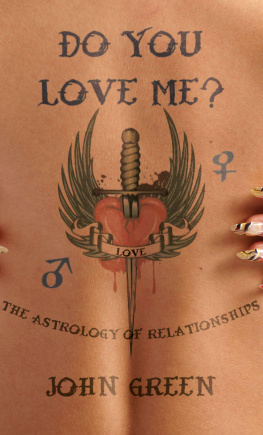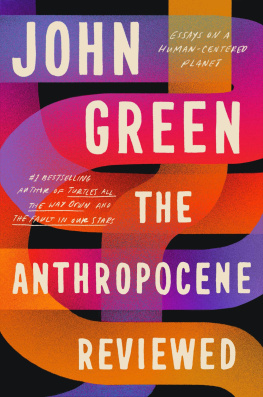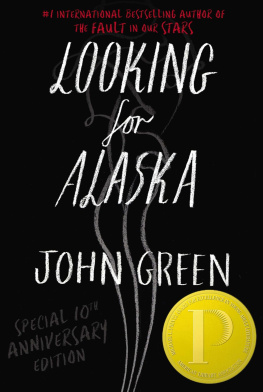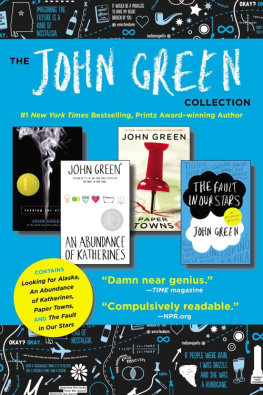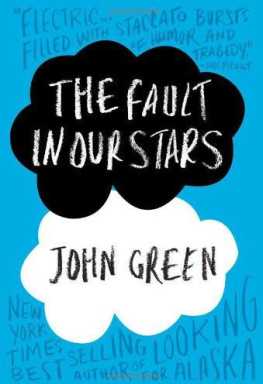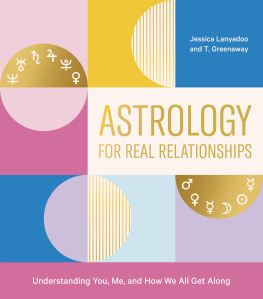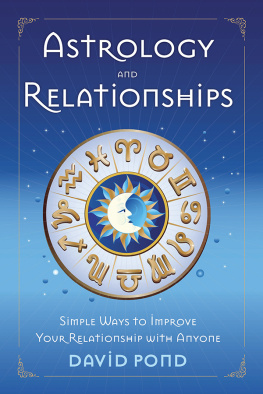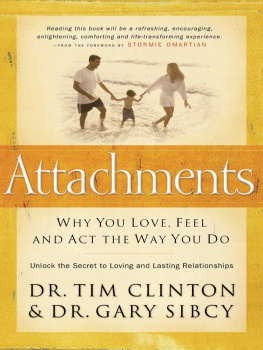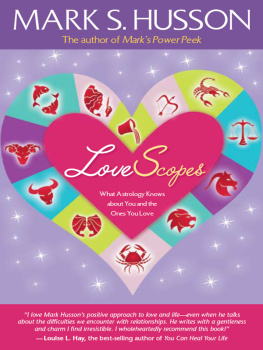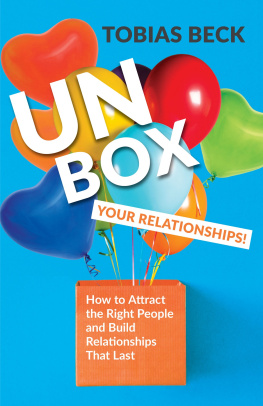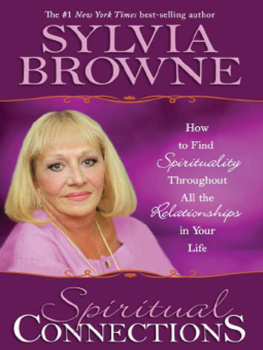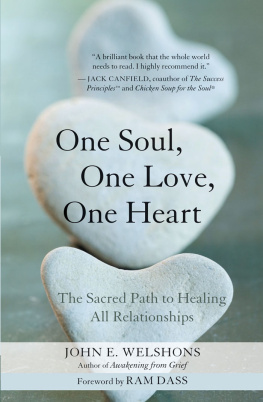DO YOU LOVE ME?
The Astrology of Relationships
John Green
MISPA Books
DO YOU LOVE ME?
This Kindle Edition published 2015 by MISPA Books
Copyright 2015 by John Green
All rights reserved.
No part of this book may be reproduced, stored in a retrieval system, or transmitted in any form or by any means, electronic, mechanical, photocopying, recording or otherwise, without the prior permission of the copyright holder.
John Green has asserted his right to be identified as the author of this work.
Website: www.psychologicalastrology.com
Email:
Text editing: Jane Struthers
Cover: John Green
Cover font: Juan Casco
Cover images: www.123rf.com, www.depositphotos.com
Charts: Solar Fire (Esoteric Technologies)
Layout: John Green
To Deborah and Caleb with my love
Acknowledgements
My sincere thanks to my tutors at the CPA: Lynn Bell, Darby Costello, Karen Hamaker-Zondag, Charles Harvey, Dermod Moore, Melanie Reinhart, Juliet Sharman-Burke and the incomparable Liz Greene for all the knowledge, inspiration, support and help they have given me. Thank you to Jane Struthers for her excellent editing skills.
I would like to dedicate this book to all of my wonderful friends, students and clients, without whom this book would have just remained in my head.
Contents
Introduction
Relationships life is all about relationships. We may come into this life alone and leave it alone but in between those two events we have many, many relationships. Good relationships, bad ones, ones between lovers, ones with parents and siblings, with bosses and colleagues, friends and enemies. Throughout our life, we experience myriad relationship types and, as astrologers, we look to the heavens to understand the nature of these relationships. We want to understand why we have fallen in love with a particular person and why that love then withered and died. Why we make friends with certain people or have an instant dislike of others. Why a particular work colleague just rubs us up the wrong way. Synastry is the technique by which we can gain an insight into these questions. It is a simple technique, one that compares the chart of one person with that of another. You can be shown the basics of what to look for astrologically in synastry in just a couple of hours. Unfortunately, it doesnt stop there because you then have to work out what it all actually means. Thats the harder part and thats why I wrote this book.
This book is for the astrological student looking to understand the nature of relationships in their own life and for their clients. I hope to explain the basics of synastry, give you some guidance in how to approach relationship astrology and hopefully help you understand a little more about the relationships you will encounter. It isnt a cookbook; whilst I will give some interpretations along the lines of What does it mean that his Sun is on my Saturn?, that isnt the key to understanding relationship astrology. You need to look deeper into each individual chart for that and so I wrote this book to try and explain that, because I hadnt found a book which described synastry in that way.
We will take a long look at the nature of romantic relationships as I have found these are the relationships most clients particularly want to understand, but we wont be ignoring other relationships. Synastry techniques can be used in many ways so that with a shift of emphasis we can also understand our dealings with family, friends, colleagues and even the country we live in.
Primarily, though, this book is about love relationships. Its amazing how even the most ethical astrologers among us tend to throw caution to the wind when theres somebody new in our life. You know the high-minded phrases we spout, like No, I would never look at anyones chart without their complete permission, seem to disappear when somebody new comes into our life and we innocently ask Whens your birthday? Whats the time you were born? Oh, no reason, just interested. And we go home, open up our astrology program, and proceed to dissect their life. We want to know what makes others tick, what they feel about us, why we feel the way we do about them. We want to know the answer to the question Do you love me?
This book is based on a series of online seminars I gave on synastry to a select group of my students during June and July 2014. The audience questions asked in the text are from them and I think including these helps to answer some questions that might be on peoples minds as they read this book.
I have been asked in the past if understanding relationship astrology means that I have perfect relationships. No. It isnt that simple. Synastry wont help you have a perfect life, but it will help you understand the dynamics that are going on within your relationships, and it may help you to save one that you feel is in difficulties. Now lets make a start
Chapter One Relationships
What are relationships all about?
We are born with some relationships, some are thrust upon us and some we choose for ourselves. The ones we were born with with our parents, siblings and other assorted family members are our initial template for relationships which we need to learn to deal with. How we manage the relationships with our mother or father, brother or sister will repeat, further down the line, in dealing with others. We might find that a work colleague reminds us of a brother or sister, or a partner may spark off memories of our relationship with our mother or father. By studying the natal chart we can gain a glimpse into the psychological nature of these formative relationships and how our future dealings with others may play out. Our chart tells us something about the people involved and also tells us an awful lot about ourselves how we perceived these relationships through our own particular lens on the world. The description of mother or father and so on in our birth chart is only about how we perceived them to be, what we took from that particular relationship.
If you discuss your mother, for example, honestly with a sibling youll most likely get very different descriptions of the person you both feel you know intimately. You might agree on certain things, such as She adored animals or She had a sarcastic sense of humour, but other characteristics can seem very different. One sibling may see her as wonderfully loving and providing great nurturance, the other as too emotionally clingy and overwhelming. Its the same person, was she really so different to each child? Well, yes, to an extent she probably was: the maxim that we all love our children equally is a lovely phrase but perhaps not so truthful in actuality. The way each sibling describes their mother shows not only their individual perception of her but also which aspect of the archetype of the Great Mother they took from her. A very emotional or watery mother might be welcomed by a child who needed that type of nurturing and had similar watery characteristics, but to one who has a lot of air in their chart the mother may be felt as stifling, too clingy, wanting too much from them. Its all a matter of our individual perspective.
As we grow up and start developing our own relationships the ones we choose ourselves we are still influenced by these primary relationships but another factor comes into play: the nature of who we are. The relationships we choose tell us a great deal about who we are as people, what we like about ourselves, what we dont like, what we have and what we lack. These too are all present in our chart it shows what we are seeking to find in ourselves through others.
To me, our chart shows us a blueprint of who we are and the path we need to take in order to become the best person we can be, but it isnt an easy process. If we describe it in Jungian terms, it is about individuation. Jung saw individuation as the process of self-realization: it is about discovering our own individual meaning and purpose in life and becoming who we really are. What we think of as love isnt just about love per se, it isnt just about relationships, but how we define ourselves through relationships. In Platos Phaedrus , he says that we see mirrored in the face of our beloved a glimpse of the god to whom our soul belongs. Our beloved, whether it is a person, object or intellectual ideal, is the mirror of our own soul.

